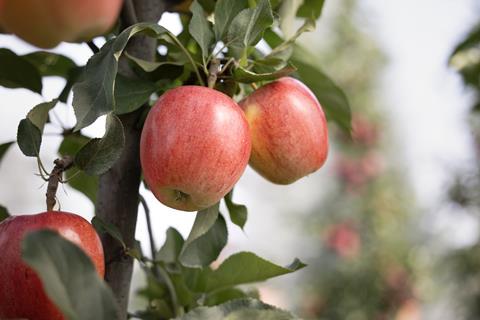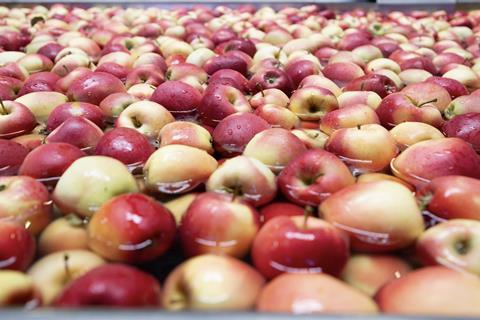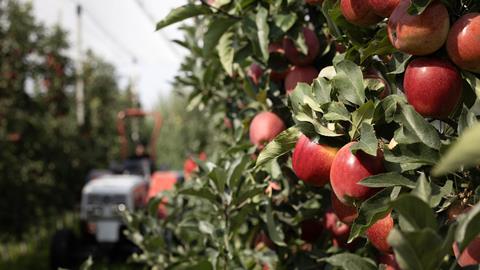What rules apply to organic fruit production in the EU, and how are organic labels used to communicate with consumers?
Organic farming means complying with the rules governing organic farming. These rules, based on general and specific principles, aim to promote environmental protection, preserve biodiversity in Europe and increase consumer confidence in organic products. And these are marked with a special logo for organic farming, the eco-label (Green Leaf). It is a combination of two symbols: the European flag and a leaf that symbolises nature and the idea of sustainability. The EU organic logo makes it easier for consumers to recognise organic products and helps farmers to market them throughout the EU.
Organic farming rules
…regulate all areas of organic farming and are based on a number of basic principles such as the ban on GMOs, the ban on ionising radiation, and the restriction of the use of chemical fertilisers, herbicides and other chemical plant protection products. Consequently, organic producers must take various measures to maintain soil and crop fertility: crop rotation, growing nitrogen-fixing and other crops as green manure to restore soil fertility, banning the use of mineral nitrogen fertilisers; and to reduce the impact of weeds and pests, organic farmers choose resistant or more tolerant varieties and practices that promote natural pest control.

Labels
…play an important role in informing consumers about the origin and characteristics of the products. Such labels can contain key symbols and indications that the product meets certain environmental standards. In Europe, for example, the Euro leaf is a popular label. An additional label is also ‘GMO-free’, which means that the product does not contain genetically modified organisms. The manufacturer or supplier can also provide information on the labels about how the production and packaging of the product impacts the environment (eg. reducing CO2 emissions, using renewable raw materials). The production conditions can be indicated, eg. that the product was produced according to the principles of sustainable development and fair trade. Other information can relate to quality, eg. that the product does not contain artificial colors, preservatives, etc. These labels help consumers make informed purchasing decisions while supporting sustainability and environmental protection.

Foreign examples
In Germany and Austria, various environmental standards and certifications are used to promote sustainability and environmental protection. Depending on the industry, these are different certifications. In 2001, a state eco-label was introduced in Germany. A green-bordered hexagon identifies food products that have been produced and controlled in accordance with EU legislation on organic farming. In addition, in Germany, Austria and other EU countries, there is the EU Ecolabel, the EU organic certificate, which guarantees that the product meets high environmental and health standards. It is a voluntary initiative designed to encourage companies to offer environmentally friendly products. The European Ecolabel is a voluntary certification system introduced in 1992 by the European Commission to encourage suppliers (manufacturers and service providers) to develop and market environmentally friendly products and services. Polskie Centrum Badań i Certyfikacji S.A. is the competent body notified to the European Commission that carries out the procedure for assessing the conformity of products and services with the EU Ecolabel in Poland. For more information, see www.pcbc.gov.pl.
The impact of labelling on the organic market
The organic food logo, the Green Leaf, provides the EU with a unified visual identity for organic products sold on the old continent. This helps EU consumers recognise organic products and makes it easier for farmers to market them in all EU countries. The organic logo can only be used on products that have been certified as organic by an approved certification body or control authority. This means that they must meet strict conditions regarding their production, transport and storage.
The labelling of organic products has a significant impact on the market on several levels. First and foremost, it is intended to increase consumers’ awareness of the origin of products and their impact on the environment, which in turn increases their interest in organic products. Demand for organic products supports farmers and producers who use environmentally friendly farming practices. Growing trust in products with the Green Leaf label can ultimately lead to stronger brand loyalty and higher profitability for organic farms. Products labelled as organic can be sold at higher prices, creating a premium segment in the consumer goods market.
Organic labelling is often linked to regulations to protect consumers and promote sustainability. Producing organically labelled food is also a way to improve competitiveness with other market participants, including through better knowledge of organic producers and the introduction of new, innovative technologies.

From 2022 under the new rules
Organic farming is a fast-growing sector of EU agriculture, which is a direct result of increasing consumer interest in organic products. In response to the challenges of this rapid development and to create an effective legal framework for the sector, the EU has adopted new rules for the organic sector, which apply from 1 January 2022. Examples of changes introduced with the new organic rules include:
• Strengthening the control system and thus increasing consumer confidence in the EU’s organic production system
• New rules for producers that will make it easier for small farmers to switch to organic farming
• New rules for imported organic products to ensure that all organic products sold in the EU meet the same standards
• A wider range of products that can be marketed as organic





